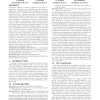Free Online Productivity Tools
i2Speak
i2Symbol
i2OCR
iTex2Img
iWeb2Print
iWeb2Shot
i2Type
iPdf2Split
iPdf2Merge
i2Bopomofo
i2Arabic
i2Style
i2Image
i2PDF
iLatex2Rtf
Sci2ools
140
click to vote
KDD
2008
ACM
2008
ACM
Structured learning for non-smooth ranking losses
Learning to rank from relevance judgment is an active research area. Itemwise score regression, pairwise preference satisfaction, and listwise structured learning are the major techniques in use. Listwise structured learning has been applied recently to optimize important non-decomposable ranking criteria like AUC (area under ROC curve) and MAP (mean average precision). We propose new, almost-lineartime algorithms to optimize for two other criteria widely used to evaluate search systems: MRR (mean reciprocal rank) and NDCG (normalized discounted cumulative gain) in the max-margin structured learning framework. We also demonstrate that, for different ranking criteria, one may need to use different feature maps. Search applications should not be optimized in favor of a single criterion, because they need to cater to a variety of queries. E.g., MRR is best for navigational queries, while NDCG is best for informational queries. A key contribution of this paper is to fold multiple ranking ...
Data Mining | KDD 2008 | Non-decomposable Ranking Criteria | Ranking Loss Functions | Robust Ranking Model |
Related Content
| Added | 30 Nov 2009 |
| Updated | 30 Nov 2009 |
| Type | Conference |
| Year | 2008 |
| Where | KDD |
| Authors | Soumen Chakrabarti, Rajiv Khanna, Uma Sawant, Chiru Bhattacharyya |
Comments (0)

